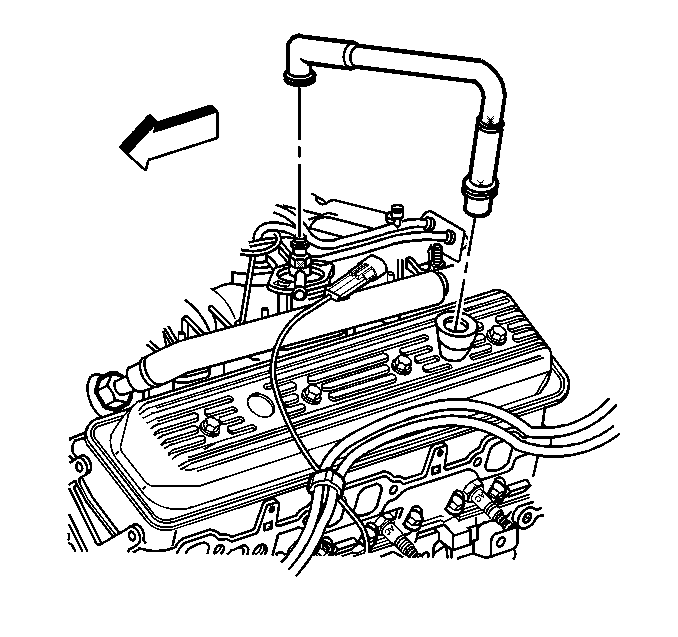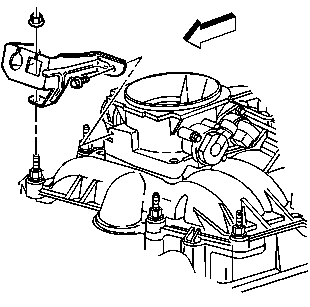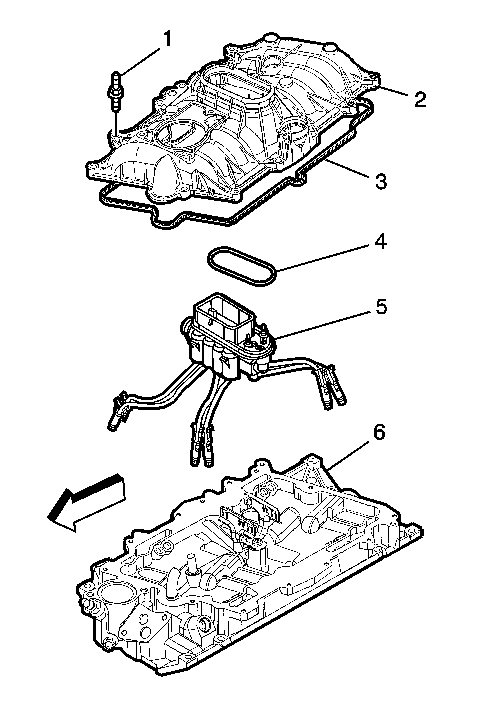Removal Procedure

- Disconnect the battery negative cable. Refer to
Battery Negative Cable Disconnection and Connection
in Engine
Electrical.
- Remove the engine cover. Refer to
Engine Cover Replacement
in Interior Trim.
- Remove the air cleaner intake duct. Refer to
Air Cleaner Assembly Replacement
in Engine Controls.
- Disconnect the following electrical connectors:
- Remove the vacuum brake booster hose, if equipped.
- Remove the PCV tube at the intake manifold.
Twist to unlock the PCV tube.

- Disconnect the spark plug
wires from the left side of the distributor cap. Refer to
Spark Plug Wire Replacement
in Engine Electrical.
- Remove the fuel pipes from the rear of the engine. Refer to
Fuel Hose/Pipes Replacement - Engine Compartment
in Engine Controls.
- Remove AIR bypass hose assembly, if so equipped. Refer to
Secondary Air Injection Vacuum Control Solenoid Valve Replacement
in Engine Controls.
- Remove the EVAP canister purge solenoid valve from the engine.
Refer to
Evaporative Emission Canister Purge Solenoid Valve Replacement
in Engine Controls.
- Remove the accelerator control cable and the cruise control cable,
if equipped, from the throttle shaft. Refer to
Accelerator Control Cable Replacement
in Engine Controls.
- Remove the accelerator control cable bracket from the throttle
body and the intake manifold and set it aside.

- Remove the upper intake
manifold bolts from the engine and then remove the upper intake manifold (2).
- Clean all sealing surfaces.
Installation Procedure

Notice: Use the correct fastener in the correct location. Replacement fasteners
must be the correct part number for that application. Fasteners requiring
replacement or fasteners requiring the use of thread locking compound or sealant
are identified in the service procedure. Do not use paints, lubricants, or
corrosion inhibitors on fasteners or fastener joint surfaces unless specified.
These coatings affect fastener torque and joint clamping force and may damage
the fastener. Use the correct tightening sequence and specifications when
installing fasteners in order to avoid damage to parts and systems.
- Install the upper
intake manifold (2) to the engine.
Tighten
- Tighten the upper intake manifold studs on the first pass to 12 N·m (44 lb
in).
- Tighten the upper intake manifold studs on the second pass to
10 N·m (89 lb in).
- Install the accelerator control cable bracket (3) to the throttle
body and the lower intake manifold.
Tighten
Tighten the bolts and nut to 12 N·m (106 lb
in).
- Install the accelerator control cable and the cruise control cable,
if equipped, to the throttle shaft . Refer to
Accelerator Control Cable Replacement
in Engine Controls.
- Install the EVAP canister purge solenoid valve to the engine.
Refer to
Evaporative Emission Canister Purge Solenoid Valve Replacement
in Engine Controls.
- Install the fuel pipes to the rear of the engine. Refer to
Fuel Hose/Pipes Replacement - Engine Compartment
in Engine Controls.

- Connect the spark plug wires to the left side of the distributor cap.
Refer to
Spark Plug Wire Replacement
in Engine Electrical.
The wires and the distributor cap are numbered in order to aid assembly.
- Install AIR bypass hose assembly, if so equipped. Refer to
Secondary Air Injection Vacuum Control Solenoid Valve Replacement
in Engine Controls.
- Install the PCV tube to the intake manifold. Twist to lock the
PCV tube .
- Install the vacuum brake booster hose to the intake manifold,
if equipped.
- Connect the following electrical connectors:
- Install the air cleaner intake duct. Refer to
Air Cleaner Assembly Replacement
in Engine Controls.
- Install the engine cover. Refer to
Engine Cover Replacement
in Interior Trim.
- Connect the battery negative cable. Refer to
Battery Negative Cable Disconnection and Connection
in Engine
Electrical.





